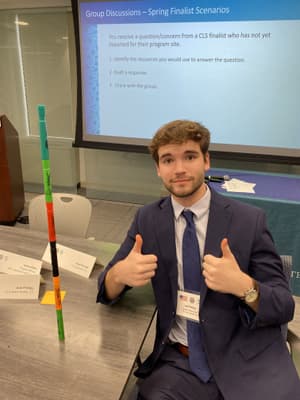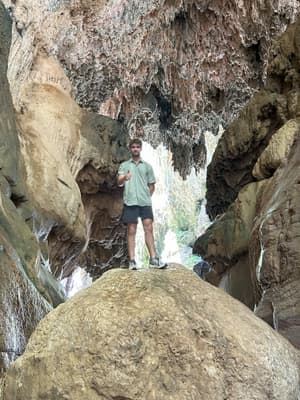Josh Phillips is an undergraduate student at Mississippi State University majoring in Economics, Political Science and Government. Josh participated in the 2024 CLS Arabic Program in Amman, Jordan hosted by Jordan Language Academy and is an alumnus of CLS Spark Arabic hosted by the Teaching Arabic as a Foreign Language (TAFL) Center of the University of Alexandria in Egypt. Josh hopes to work in U.S. public diplomacy and use his Arabic language skills to strengthen relations between the U.S. and Arabic speaking countries.
The Critical Language Scholarship (CLS) Program offers so much more than just a chance to take a foreign language course overseas. Sure, you could just show up to your host institution every day to take classes in a bubble of American scholars – but that would only scratch the surface of what CLS offers. Because you’re living overseas, you have an unparalleled opportunity to live in a culture that you cannot experience anywhere else in the world; to engage directly with native speakers in the language that you’re studying. Every scholar has the ability to engage with the community around them, and every scholar’s experience with this engagement is unique. For me, on the CLS Program this past summer in Amman, Jordan, engagement looked like serving as an English language teacher at a refugee center called the Collateral Repair Project (CRP).

As of today, Jordan is the host to almost 700,000 refugees of different nationalities registered with the United Nation’s Refugee Agency (UNHCR). They come predominantly from Syria, while there are also large groups from Iraq, Yemen, Sudan, and Somalia. More than 82 percent of the refugees living in Amman live outside of refugee camps in urban areas. The Collateral Repair Project was established as a grassroots organization in 2006 in the Hashemi Shamali area, a part of the city with a high population of displaced persons. It offers predominantly community-designed programming that seeks to meet the needs of refugees and Jordanians in need.
English classes are one of the programming services offered by CRP, and is by far one of the most popular programs. English-language skills are invaluable to refugees, as Syrian and Iraqi refugees often hope to eventually resettle in English-speaking countries. Learning to speak English can also help refugees find employment in the future and more easily integrate into their new communities. English also provides opportunities for refugees to connect with people all over the world – one of whom would be a certain native English speaker on a Critical Language Scholarship in Amman.
After applying for the position with CRP, I began teaching very soon after my arrival in Amman. I was assigned to teach an intermediate English language class twice a week for an hour on Mondays and Wednesdays. My class of about fifteen was very diverse, with people ranging from under 10 to over 50 years old and from countries from Iraq to Yemen. Teaching wasn’t easy at first, especially since I was mostly teaching in Arabic, but as more and more classes went by, those hours on Monday and Wednesday quickly became times that I looked forward to each week. We focused many of our lessons on practical applications, like going to the doctor or picking out groceries at the supermarket, and the class’s enthusiasm to learn made teaching a pleasure. I absolutely loved it, and seeing their progression as we covered more English language content was deeply rewarding.

As a part of my role with CRP, I also met with one of the refugee employees of the center twice a week for a one-on-one language partner meeting. This was a particularly sweet and enriching experience. As a displaced person from Syria, the employee I met with had a doctorate degree in literature, but due to his status as a refugee, he was unable to find work until CRP hired him. His goal was to speak English more fluently so that he could present his research to the international community and speak more confidently with English speakers. We were about the same level in each other’s native language (I spoke Arabic about as well as he spoke English) so our sessions together included lots of laughter as we tried to figure out the meaning of different words that one (or both) of us didn’t have a great translation for. He became a good friend, and I hope to return to Jordan to visit him (and my former class!) sometime soon.
My CLS Program gave me so much more than classroom language training. I cannot understate how much I learnt from the people I met through CRP. What they taught me about Iraqi, Yemeni, Sudanese, and Jordanian culture would have been impossible to glean from a book or documentary. Not only was teaching English incredibly fulfilling, but it was also academically beneficial, as I had to put my Arabic skills into practice every day in the classroom! The linguistic and cultural enrichment that I gained by being a part of CRP has complimented my CLS Program beautifully. I can’t wait to pursue future opportunities to use my Arabic language to engage with this region in the future.


